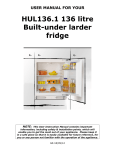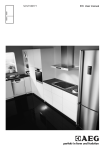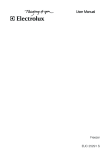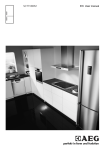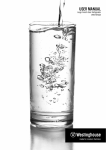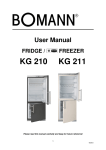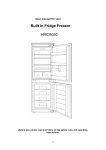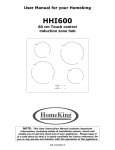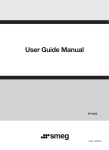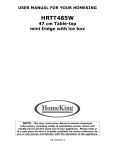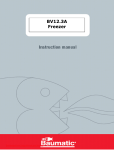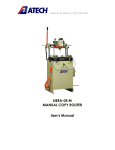Download HUZ107.1 107 litre Built-under freezer
Transcript
USER MANUAL FOR YOUR HUZ107.1 107 litre Built-under freezer NOTE: This User Instruction Manual contains important information, including safety & installation points, which will enable you to get the most out of your appliance. Please keep it in a safe place so that it is easily available for future reference, for you or any person not familiar with the operation of the appliance. GS 18/05/12 Contents Environmental note 3 Important safety information 4–5 Specifications of your freezer Dimensions Description of the appliance 6-7 6 7 Using your freezer Before switching on During first use Turning on the appliance and setting the thermostat 7-9 7-8 8 8-9 Arranging and storing food in the fridge section Making ice-cubes 9-11 11 Cleaning and maintenance Defrosting the freezer 11-13 12-13 Installation Electrical connection Positioning Aperture and appliance dimensions Supplied installation components Installing your freezer Ventilation requirements Reversing the door of your appliance 13-23 13-14 14 15 15-16 16-21 21 22-23 Troubleshooting 23-24 Technical data 25 Contact details 28 2 Environmental note Note: Before discarding an old appliance, switch off and disconnect it from the power supply. Cut off and render any plug useless. Cut the cable off directly behind the appliance to prevent misuse. This should be undertaken by a competent person. Disable the door lock to make sure that children cannot get stuck inside the appliance. 3 Important safety information Your safety is of the utmost importance to us. Please make sure that you read this instruction booklet before attempting to install or use the appliance. If you are unsure of any of the information contained in this booklet, please contact the Advice Line. IMPORTANT: Any installation work must be carried out by a qualified electrician or competent person. Use of the appliance o Your appliance is only designed to be used in the home. It is suitable for storing food that needs to be kept frozen. If it is used for any other purpose or it is not used correctly, then the manufacturer will accept no liability for any damage that may be caused. o Altering the specification of the appliance must not be attempted for reasons of safety. Before using your appliance o Check the appliance for any signs of transport damage. If you notice any damage, then you should not connect your appliance to your mains supply and should contact your retailer. Refrigerant o Your appliance contains R600a refrigerant, which is a natural gas that does not contain CFCs that can damage the environment. However it is a flammable substance, therefore care should be taken: During the transportation and installation of the appliance, make sure that the refrigeration pipe work does not get damaged. If it does become damaged then sources of ignition and open flames should be avoided. Also the room that the appliance is situated in should be thoroughly ventilated. o Do not place any objects on top of the appliance, as this may damage the table top. 4 Child safety o Packaging material should be kept away from children. o Children should not be allowed to touch the controls or play with the appliance. General safety o Do not pull on the power supply cable to remove the plug from your mains supply socket. o Do not pull out or insert the plug with wet hands. o Do not attempt to use your appliance outdoors or any place where it is likely to come into contact with the elements. o Before cleaning the appliance or performing maintenance work, ensure that the appliance disconnected from your mains supply. has been o Never allow the back coils of the appliance to come into contact with the wall surface. o Always ensure that the location where you are installing your appliance is free of stored items such as papers and other flammable materials. o Never block the ventilation openings of the appliance, either on the inside or its exterior. o It is vital to keep your appliance well ventilated, so that there is proper air flow between the bottom of the unit and the plinth/kick plate which it is sitting on. o Do not place electrical devices inside of the appliance, such as mixers and electric ice cream makers. Service You should not attempt to repair the appliance yourself, as this could cause injury or a more serious malfunction. If you require a service call then please contact the Customer Care Department. 5 Specifications of your freezer o o o o o o o o o Total gross capacity: 107 litres Total net capacity: 95 litres Manual defrost Freezing capacity: 9 kg / 24 hours Adjustable thermostat Temperature rise warning light 3 Freezer drawers Reversible door Door-on-door fittings Dimensions of appliance Height: Width: Depth: 818 - 889 mm 595 mm 548 mm Dimensions of aperture* Height: Width: Depth: 820 - 890 mm 600 mm 550 mm MIN Energy efficiency class Energy class: A+ * Please refer to the installation instructions for more specific information on the size of aperture that you will require. IMPORTANT: When you install your appliance it is important to bear in mind its climatic rating. In order to find out the climatic rating of your appliance, you should check the rating plate. The rating plate is located on the front left edge of the inside of the freezer section. You will need to open the door of your appliance to be able to find it. The rating plate will indicate the ambient temperature range that your appliance will function correctly within. 6 Description of the appliance 1) Thermostat dial 2) Freezer drawers Using your freezer Before switching on o Make sure that it has been installed by a suitably qualified person, as per the information contained in the installation instructions. o After delivery, wait for eight hours before connecting the appliance to your mains supply. This will allow any refrigerant gasses that may have been disturbed during the transportation process to settle. o The outside of the appliance and the removable accessories contained within it, should be cleaned with a solution of liquid detergent and water. 7 o The interior of the appliance should be cleaned with a solution of sodium bicarbonate dissolved in lukewarm water. The interior and accessories should be thoroughly dried, after the cleaning process has been completed. o There can be an odour when you first switch on the appliance. It will lessen as the appliance starts to cool. During first use o When you first switch on the appliance, the compressor will run continuously for approximately 24 hours or until the freezer reaches a cool enough temperature. o During this period of time, you should try not to open the door frequently or place a large amount of food within the appliance. o If the unit is switched off or unplugged, you must allow at least 5 minutes before restarting the appliance on the thermostat or connecting it to your mains supply. Turning on the appliance and setting the thermostat You switch on your appliance by connecting it to your mains supply and setting the thermostat. The thermostat dial is located at the base of the freezer. o The thermostat automatically regulates the temperature inside the freezer, depending on what number you have turned the thermostat control knob to. o Position <0> means that the appliance will not cool. o Position <1> will give you a higher temperature inside the freezer. o Position <5> will give you a lower temperature inside the freezer. 8 o Position <SF> will cause the compressor to run continuously with maximum performance. The freezer temperature will decrease and the appliance will switch to the lowest temperature. This can be used for food that needs to be frozen quickly. You should place the food to be frozen quickly ideally in the middle drawer. Once the food is frozen the thermostat dial should be returned to the normal setting. o Ideally the thermostat should be set to a position between <3> to <4>. o IMPORTANT: The ambient temperature of the room, the temperature of food and the amount of food that has been placed in the appliance and how often the door is opened, will all affect the temperature being maintained by the appliance. o On the maximum settings (position <5> and <SF>), your fridge will work harder to maintain a lower temperature and will increase the energy usage. There is no need to run your appliance on these settings for prolonged periods and you should return the thermostat knob to between <3> to <4>. o Compressor light: This glows orange when the compressor is running. In the <SF> mode the light will be on continuously. o Power light: This lights green automatically when the appliance is connected to the power supply. o Alarm light: This lights red when the temperature rises to a critical point inside of the freezer and the food is in danger of thawing. Arranging and storing food in the freezer o The freezer should be used for freezing fresh foods and for storing frozen foods for the period of time indicated on the packaging and for making ice cubes. o For freezing fresh food, wrap and seal fresh food properly. The packaging should be air tight and should not leak. Special freezer bags, aluminium foil (heavy grade or double wrap), polythene bags and plastic containers are ideal. o The maximum amount of fresh food that can be frozen in 24 hours is 9 kg. 9 o For optimum appliance performance and to reach maximum freezing capacity, turn the thermostat dial to the <SF> position when placing fresh food in the freezer. o After placing fresh food in the freezer, 24 hours on <SF> mode is generally sufficient. After 24 hours you should deactivate the <SF> mode by turning the thermostat back to its normal position. o IMPORTANT: In order to save energy, when freezing small amounts of food, the <SF> function is not necessary. o Do not allow the fresh food to be frozen to come into contact with the already frozen food. o Always mark the date and content on the pack and do not exceed the stated storage time. o In case of power failure or malfunction, the freezer compartment will maintain a sufficiently low temperature for food storage for a period of time. However, avoid opening the freezer door to slow down the temperature rise within the freezer compartment. o Never place warm food into the freezer compartment. o When purchasing and storing frozen food products, ensure that the packaging is not damaged. o The storage time and the recommended temperature for storing frozen foods are indicated on the packaging. For storing and using, follow the manufacturer’s instructions. If no information is provided the food should not be stored for longer than 3 months. o Place the frozen food in the freezer compartment as soon as possible after buying it. o Once the food is thawed, it must not be refrozen. You must cook it as quickly as possible in order to consume or to freeze it once again. o If you want to use the maximum capacity, you can remove the drawers and store the items directly on the cooling tubes. This will enable you to make use of the entire volume of the compartment but you must ensure you do not overload the freezer as this will affect the performance. o Do not open the freezer door too often or leave the door open for long periods of time, as this will increase the temperature inside of the appliance and will increase the energy usage. 10 o Warm food should be allowed to cool down before you attempt to freeze it. If you place warm food in the freezer section, then the increased humidity will cause quicker ice formation and increase the amount of power that the appliance uses. Making ice-cubes o When making ice-cubes, fill the ice tray 2/3 with water and place it in the freezer compartment. o After the water has completely turned to ice, you can twist the tray as shown in the diagram above in order to release the icecubes. Cleaning and maintenance WARNING: PLEASE ENSURE THAT YOUR APPLIANCE IS DISCONNECTED FROM YOUR MAINS SUPPLY BEFORE ATTEMPTING TO CLEAN IT. o Do not clean the appliance by pouring water onto it or spraying water over it. o The freezer should be cleaned periodically, using a solution of bicarbonate of soda and lukewarm water. o Clean the accessories separately with soap and water. Do not clean them in a dishwasher. o Do not use abrasive products, detergents or soaps. 11 o After washing the appliance, wipe over the area that you have cleaned with a damp cloth and then dry it thoroughly. o When cleaning is complete, dry your hands and then reconnect the plug to your mains supply. Defrosting the freezer IMPORTANT: Never use sharp metal tools to remove the frost as this can damage the refrigeration circuit. o After a period of time, frost will build up in certain areas in the freezer compartment. The frost should be removed periodically. You can use a plastic ice-scraper for this procedure. o A complete defrost will become necessary if the frost layer exceeds 3-5 mm to maintain the efficiency of the freezer. o The day before you defrost, set the thermostat dial to position <5> to freeze the foods completely. o During defrosting, frozen foods should be wrapped in several layers of paper and kept in a cool place. The inevitable rise in temperature will shorten their storage life. Remember to use these foods within a relatively short period of time. o Set the thermostat dial to position <0> and switch off the appliance. IMPORTANT: You must unplug the appliance from the mains supply before continuing. o Leave the door open to accelerate the defrosting process. Remove the defrost water from the compartment. If there is defrost water on the freezer floor you can clear it up using a sponge. 12 o Clean the interior by hand using lukewarm water and a little detergent. NEVER use abrasive products or aggressive cleaning agents. o Dry the inside of the appliance and plug in the mains. Set the thermostat dial to position <5> for 24 hours before resetting the thermostat dial to the normal position. o IMPORTANT: Do not reintroduce the food into the freezer until it has sufficiently cooled. Installation IMPORTANT: Before installation and usage, read all the instructions and make sure that the voltage (V) and the frequency (Hz) indicated on the rating plate are exactly the same as the voltage and frequency in your home. The rating plate can be found on the front left edge of the inside of the refrigerator. The manufacturer declines all responsibility in the event of the installer failing to observe all the accident prevention regulations in force, which are necessary for normal use and the regular operation of the electric system. Electrical connection YOUR FREEZER IS INTENDED FOR FITTED AND PERMANENT INSTALLATION. We recommend that the appliance is connected by a qualified electrician, who is a member of the N.I.C.E.I.C. and who will comply with the I.E.E. and local regulations. o Your freezer comes supplied with a 13 amp plug fitted. If in future you need to change the fuse in this plug, then a 13 amp ASTA approved (BS 1362) fuse must be used. o The wiring in the mains lead is coloured as follows: Brown Live Blue Neutral Green and yellow Earth o As the colours of the wires in the appliance’s mains lead may not correspond with the coloured markings identifying the terminals in your spur box, please proceed as follows: The brown wire must be connected to the terminal marked “L” (live), or coloured red. 13 The blue wire must be connected to the terminal marked “N” (neutral), or coloured black. The green and yellow wire must be connected to the terminal marked “E” (earth), or by the earth symbol, or coloured green and yellow. o When the connection is completed, no stray strands or cut wire should be present. The cord clamp must be secured over the outer sheath. Positioning o It is advisable that your appliance is only installed in a location where the ambient temperature of the room, corresponds with the climate classification that is stated on the rating plate of your appliance. Your appliance may not function correctly if the ambient temperature falls outside of the following ranges. Climate classification SN N ST T Appropriate ambient temperature +10 to +32 degrees centigrade +16 to +32 degrees centigrade +16 to +38 degrees centigrade +16 to +43 degrees centigrade o Your appliance should not be located in direct sunlight or exposed to continuous heat or extremes of temperature (e.g. next to a radiator or boiler). o The door should be able to open completely and freely o The appliance should be situated so you can easily access the food that is stored in it. o You should check whether there is an electrical socket available, which will be accessible after your appliance is installed. 14 Aperture and appliance dimensions o The diagram above shows the aperture size that you will need to be able to install your appliance. Supplied installation components o The diagrams below show the contents of the supplied installation kit and the tools you will require to carry out the installation process. o Throughout the installation instructions, you will see the diagrams contain number references to show which component the image is referring to. 1) 2) 3) 4) 5) 6) Wood screw (17 pcs) Door hang Door bottom fixings (2 pcs) Hang cover Screw Top bracket Tools required 15 7) Water gauge 8) Wrench 9) Setsquare 10) Screwdriver Installing your freezer If you need the appliance door to open from the other side, then please reverse the door before commencing the installation process. (See “Reversing the door” section). o Remove the screw (5) at the top of the appliance and place the top bracket (6) in its place. o Fix the bracket with the screw (5). 16 o Take out the gasket (11) located on the side panel and remove the protective tape. o Stick the gasket on the reverse side of the door hinges of the appliance. o You should use a water gauge (7) to ensure the appliance is level. 17 o Slide the appliance into the kitchen unit and align the hinge surface with the front surface of the kitchen unit using a setsquare (9). o Screw the hinges and metal bracket to the kitchen unit using screws (1). o Unscrew and remove the nuts and washers from the appliance door. Place the door hang (2) on the appliance door by inserting the holes on the adjustment bolts. 18 o Dimension B: Measure from the underside surface of the kitchen unit to the bottom of the door hang. o Dimension C: Measure from the underside surface of the kitchen unit to the top of the next unit door. o Subtract measurement C from measurement B. Place the door hang (2) using this dimension for the vertical position and place it in the centre for the horizontal position. o Screw the door hang (2) into place using the screws (1). o Place the cabinet door onto the appliance door by inserting the adjustment bolts into the slots on the door hang. o Place the washers and screw nuts onto the adjustment bolts. 19 o Close the door and check the alignment with the other cabinet doors. Make the adjustment of the unit door by screwing or unscrewing the adjustment bolts using a screwdriver (10) for vertical adjustment and by the help of the slots on the door hang for other directions. o Tighten the nuts using a wrench (8) to fix the bracket. o Remove the screws (1) at the bottom of the appliance door. o Place the door bottom fixings (3) into position and screw the fixings to the appliance door and the cabinet door. 20 o Slide the hang cover (4) onto the door hang. o Position the plinth providing a minimum 25 mm gap between the cabinet door and fix it. NOTE: There are ventilation slots in the front of this appliance. If the height of the plinth covers any of the ventilation slots, then a cut-out must be made in the plinth to ensure that all of the ventilation slots are exposed. 21 Reversing the door of your appliance Caution! After unscrewing any of the fixing hinges, hold the door to prevent it from falling and causing damage. Any parts that you remove from the appliance whilst reversing the door, should be retained for later use. o Unscrew the screws on the front surface of the appliance door. Take the appliance door off and place it on a soft surface where it will not be scratched. o Move the hole plugs on the appliance door’s front surface to the holes on the reverse side. o Open the door upper disassemble them. hinge and door lower hinge and 22 o Move the hole plugs to the opposite side. o Assemble the door upper hinge and door lower hinge to the opposite corners of their original position. o Assemble the appliance door. Troubleshooting IMPORTANT: If your freezer appears not to be operating properly, before contacting the Customer Care Department, please refer to the checklist below. My freezer does not appear to be working/there is no power to my appliance. o Check that the plug is fully inserted into the power socket. o Check that there is power to your mains supply (e.g. that there hasn’t been a power cut or that the fuse hasn’t blown). o Check that the thermostat has not been turned to the off position. o Check that your mains supply voltage, corresponds to the voltage stated on the rating plate of your appliance. My freezer appears to be performing poorly o Check that the appliance isn’t overloaded and that food hasn’t been packed too tightly into it. o The thermostat setting is too low; you should turn the thermostat up higher. o Ensure that the door is closing properly and that the door has not been opened for a prolonged period in error. o Ensure that there is adequate ventilation for your appliance. My freezer is noisy o The refrigerant gas that circulates the pipe work of the appliance may make a slight noise, even if the compressor is not running. o If the noise worsens or the appliance gets louder than normal; check that it is leveled off correctly, that nothing is touching the rear of the freezer and that nothing placed inside the appliance is rattling. 23 There is water in the base of the freezer or leaking out of my freezer. o Follow the “Defrosting the freezer” section on pages 12 - 13. 24 Technical Data Manufacturer Model Number Product Category Energy Efficiency Class (1) Annual Energy Consumption (2) Storage Volume of Fridge Compartment Storage Volume of Freezer Compartment Star Rating Frost Free Compartments Temperature Rise Time Freezing Capacity Climate Class (3) Noise Level Installation Type HOMEKING HUZ107.1 8 – Upright Freezer A+ 187 kWh 95 litres 4 18 hours 9kg/24hr SN 44 dB Built-in (1) On a scale from A+++ (highest efficiency) to G (lowest efficiency). (2) Annual energy consumption based on standard test results for 24 hours. The actual energy consumption will depend on how the appliance is used and where it is located. (3) This appliance is intended to be used at an ambient temperature between “10°C” (lowest temperature) and “32°C” (highest temperature). 25 26 27 United Kingdom 6 Bennet Road, Reading, Berkshire RG2 0QX United Kingdom Customer Care (0118) 933 6918 28




























